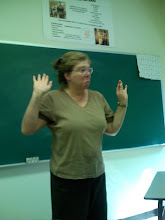Holy crap, how did it get to be the end of May already? Graduation was the first weekend in May, and now a whole twelfth of the calendar has just...evaporated. The world has grown greener; temperatures have warmed; and what have I gotten done?
I don't usually have that sense of tempus fugit; I've realized that my not-so-puritan work ethic allows me to spend afternoons with a book (fun reading, not work reading) and not feel guilty about it. Finishing a book is, in a way, "getting something done," but it's not planting flowers or dusting furniture or training the cat to sit. Okay, just joking about the last undone task.
I do religiously read the NYT, via email. Since we currently live in an area with faint, competing NPR stations, I read the Times more regularly than I hear NPR, which I miss. There's something about Susan Stamberg's voice that feels like home to me. This habitual consumption of news & opinion is one I'd like to nurture in students -- how can you think about the world if you don't know what's going on?
I'm solidly with the Times editorial writer this morning who protests the corrupted usage of the word "elite," which has been transformed to a slur. Anti-intellectualism is alive and well in this country, and the deprecatory use of "elite" is often tied to that. Are democracy and the existence of elites opposed? Only if you confuse "elite" with "elitist."
Whole discussion in NYT, if you're interested, but I'm particularly interested in the implications of "anti-elite-ism" for education. If becoming more educated is a way of "bettering" oneself, then going to college can bring about serious personal conflicts for first-generation and minority students. Are you "acting white" if you get good grades? Are you "getting above your raising" if you talk about your econ class with your dad, or try to change the way you speak, or become interested in topics that your family never discusses? These conflicts are difficult for students to articulate, but I think the effort to avoid these conflicts is one reason that students can be so career-focused: "I'm not really changing as a person, I'm just here to become more employable." And that's a tragedy.
part two -- what education ought to be -- follows

No comments:
Post a Comment